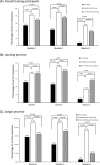Is knowledge retained by healthcare providers after training? A pragmatic evaluation of drug-resistant tuberculosis management in China
- PMID: 30904847
- PMCID: PMC6475142
- DOI: 10.1136/bmjopen-2018-024196
Is knowledge retained by healthcare providers after training? A pragmatic evaluation of drug-resistant tuberculosis management in China
Abstract
Objectives: Considering the urgent need of training to improve standardised management of drug-resistant infectious disease and the lack of evidence on the impact of training, this study evaluates whether training participants' knowledge on multidrug-resistant tuberculosis (MDR-TB) is improved immediately and a year after training.
Setting and participants: The study involved 91 MDR-TB healthcare providers (HCPs), including clinical doctors, nurses and CDC staff, who attended a new MDR-TB HCP training programme in Liaoning and Jiangxi provinces, China.
Main outcome measures: A phone-based assessment of participants' long-term retention of knowledge about MDR-TB management was conducted in July 2017, approximately 1 year after training. The proportion of correct responses in the long-term knowledge assessment was compared with a pretraining test and an immediate post-training test using a χ2 test. Factors influencing participants' performance in the long-term knowledge assessment were analysed using linear regression.
Results: Across both provinces, knowledge of definitions of drug-resistant TB, standardised MDR-TB case detection protocols and laboratory diagnosis was improved 1 year after the training by 14.5% (p=0.037), 32.4% (p<0.001) and 31% (p<0.001) relative to pretraining. However, compared with immediately after training, the knowledge of the three topics declined by 26.5% (p=0.003), 19.8% (p=0.018) and 52.7% (p<0.001) respectively in Jiangxi, while no significant decline was observed in Liaoning. Additionally, we found that obtaining a higher score in the long-term knowledge assessment was associated with longer years of clinical experience (coefficient=0.51; 95 CI% 0.02 to 0.99; p=0.041) and attending training in Liaoning (coefficient=0.50; 95% CI 0.14 to 0.85; p=0.007).
Conclusion: Our study, the first to assess knowledge retention of MDR-TB HCPs 1 year after training, showed an overall positive long-term impact of lecture-style group training on participants' knowledge. Knowledge decline 1 year after training was observed in one province, Jiangxi, and this may be partly addressed by targeted support to HCPs with fewer years of clinical experience.
Keywords: China; drug-resistant tuberculosis; evaluation; tuberculosis.
© Author(s) (or their employer(s)) 2019. Re-use permitted under CC BY-NC. No commercial re-use. See rights and permissions. Published by BMJ.
Conflict of interest statement
Competing interests: None declared.
Figures
References
-
- Stop TB Partnership. Time for Action on Antimicrobial Resistance & TB. 2017. http://www.stoptb.org/news/stories/2017/ns17_029.asp (accessed 13 Oct 2017).
-
- Global tuberculosis report 2017. Geneva, Switzerland: World Health Organization, 2017.
Publication types
MeSH terms
Substances
LinkOut - more resources
Full Text Sources
Miscellaneous

